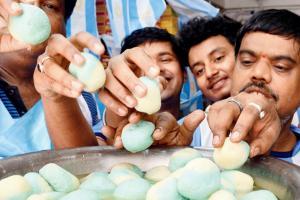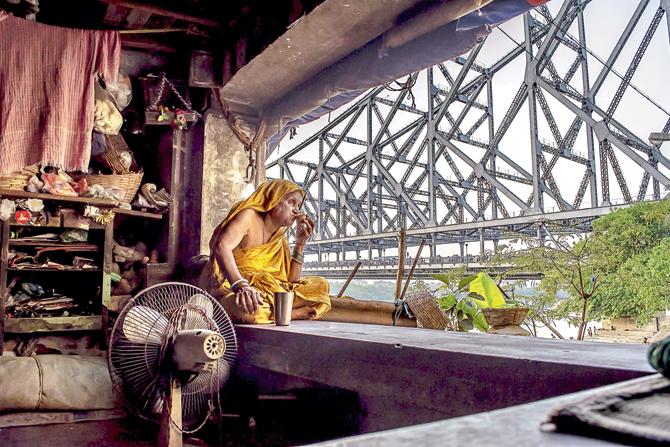Look at it this way - Kolkata doesn't mind being the cog in the wheel if money makes the world go round

Football fans who are Argentina supporters make a beeline for blue-and-white roshogollas, making for a photo thatu00c3u0083u00c2u00a2u00c3u0082u00c2u0080u00c3u0082u00c2u0099s as Bengali as it gets
Bengalis from Kolkata eat a slice of nostalgia for breakfast. They have a helping of revolution for lunch. Teatime involves a steaming cup of intellectual pursuit, called "adda". And they end their day with a hearty meal of self-pride, satisfied with the fact that despite its Miss Havisham-like crumbling decay, there is no other city like theirs in the world.
ADVERTISEMENT
So what if today it resembles a massive old-age home where bridges are falling like nine pins burdened by the weight of history, and where jobs are as scarce as non-veg eateries in Gujarat? Where else will you find a makeshift group of chess players contemplating their next move in the middle of a four-way junction? And who else but a Bengali will deride your lack of knowledge about Marx and Engels, even as he borrows money from you for his next cigarette smoke?

Bengalis can have endless cups of tea. Here, a woman spends a contemplative moment sipping on the beverage next to Howrah Bridge
Look at it this way - Kolkata doesn't mind being the cog in the wheel if money makes the world go round. The city's locals have built an almost endearing disdain for commercial pursuit, even as they grumble about Marwaris laughing their way to the bank. But it wasn't always so. There was a black-and-white era when a Bengali sense of enterprise helped build a city of palaces that was so beautiful that in 1903, the then Viceroy of India, Lord Curzon, declared Calcutta as "the second city to London in the whole British Empire". And when Japanese bombs tore through the night sky above the Kidderpore docks almost 30 years later, Lord Linlithgow, Curzon's successor, remarked, "The loss of Calcutta would be tantamount to the loss of India."
These and other nuggets of historical information are peppered across the pages of Calcutta Then: Kolkata Now (Roli Books), a coffee-table title that is an ode to a city where clocks throw up their hands in despair. Part of a series that also includes Mumbai and Chennai, this edition features Sunanda K Datta-Ray and Indrajit Hazra penning heartfelt paeans without begrudging Bengalis the idiosyncrasies that make them who they are. The photographs, curated by Pramod Kapoor and Anshika Varma, are a mix of a sepia-tinted journey into the past and a technicolour screening of today's times. Pick it up for a gripping insight into the first capital of the British Raj. And if you're Bengali, read it at breakfast for an added bite of nostalgia.
Catch up on all the latest Mumbai news, crime news, current affairs, and also a complete guide on Mumbai from food to things to do and events across the city here. Also download the new mid-day Android and iOS apps to get latest updates
 Subscribe today by clicking the link and stay updated with the latest news!" Click here!
Subscribe today by clicking the link and stay updated with the latest news!" Click here!






